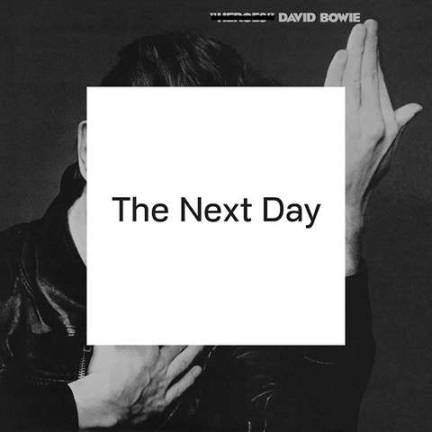Now Take Them Out, Devils: The Next Day Introduces Bowie, The Mortal (Part 1)

On the first of March it was announced that The Next Day, the first new David Bowie album in ten years, could be streamed in full on iTunes, a week and a half before the record's actual U.S. release. When I read this, my skin crawled and my stomach curdled. It was too soon. I wasn't ready. I had become a Bowie devotee at age fourteen, back when it wasn't uncommon for the man to release something every couple of years. I have this distinct memory of sitting on a park bench in Stuy Town one chilly afternoon, popping a used copy of The Rise and Fall of Ziggy Stardust and the Spiders From Mars into my CD player for the first time, and having my little mind blown wide open (I also remember I was reading Terry Pratchett and Neil Gaiman's Good Omens at the time, which also blew my mind, but in a completely different way and to a slightly lesser extent... but that's another story for another time). I spent the rest of my high school years assembling the Bowie discography, jumping from glam rock to plastic soul to drum 'n' bass to avant-garde Burroughsian experimentation. Bowie could be everywhere, try his hand at anything; and what's more, he was always making more. My third Bowie album was 2002's fantastic Heathen, a return to form after his less-than-successful '90s work (some of which is actually fantastic, but damn, another story, another time) and a critical smash. It was followed up a little over a year later with the less-good Reality, but still. David Bowie made music, and I was never gonna run out. Ever. Bowie was an ageless immortal gifted to the people of earth to create and inspire. Except for the part where he, y'know, wasn't. Within a few years of Reality's release, the Thin White Duke had all but stopped performing, and the vague promises of new material became vaguer and vaguer before completely petering out. Bowie attempted to stay relevant for a bit by [playing with Arcade Fire during the 2005 Fashion Rocks event](http://www.youtube.com/watch?v=S0Ff8dd5iV0) and providing backup vocals for TV On the Radio's ["Province,"](http://www.youtube.com/watch?v=xigAXL5e5Kw) but soon after he just quietly stepped out of the spotlight he'd been sitting under for his entire adult life. [Some pointed to a heart attack and the consequential surgery and recovery](http://www.thedailybeast.com/articles/2012/06/06/david-bowie-s-vanishing-act-and-looming-return.html) as the culprit behind Bowie's departure; I blame a[ lollipop.](http://www.youtube.com/watch?v=MsfSLzPp1io) I felt abandoned. I was resentful. How dare this man, this artist who was admittedly getting up there in years make a rational and well intentioned decision to safeguard his physical and mental well-being? How dare he stop making me beautiful things? I found I was drifting away, listening to Scary Monsters (and Super Creeps) only once a month instead of the standard twice a week. David Bowie had been my first big musical love, but the honeymoon was over. Sure, every once in a while I'd find myself getting excited about Bowie again, maybe after listening to an album for the first time in a few years, or discovering an alternate version of ["Moonage Daydream"](http://www.youtube.com/watch?v=KsH95qmmr9g) I'd never heard before, or discussing the creation of a Bowie tarot deck with a friend, but it was never the same. An unproductive and reclusive Bowie was a mortal Bowie, and a mortal Bowie just wasn't as important to me as the myth he had built himself into. Or so I thought, because I was stupid. Join us again tomorrow for part 2 of NTTOD's The Next Day Review. Follow Simon Lazarus Vasta on Twitter [@Hunter_S_Narc](https://twitter.com/Hunter_S_Narc)